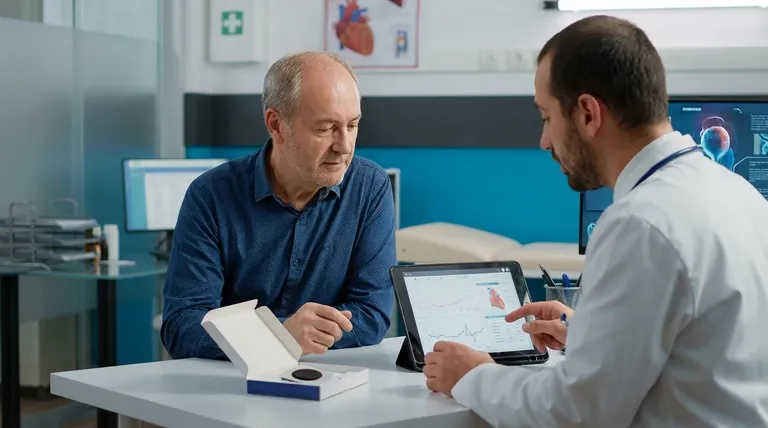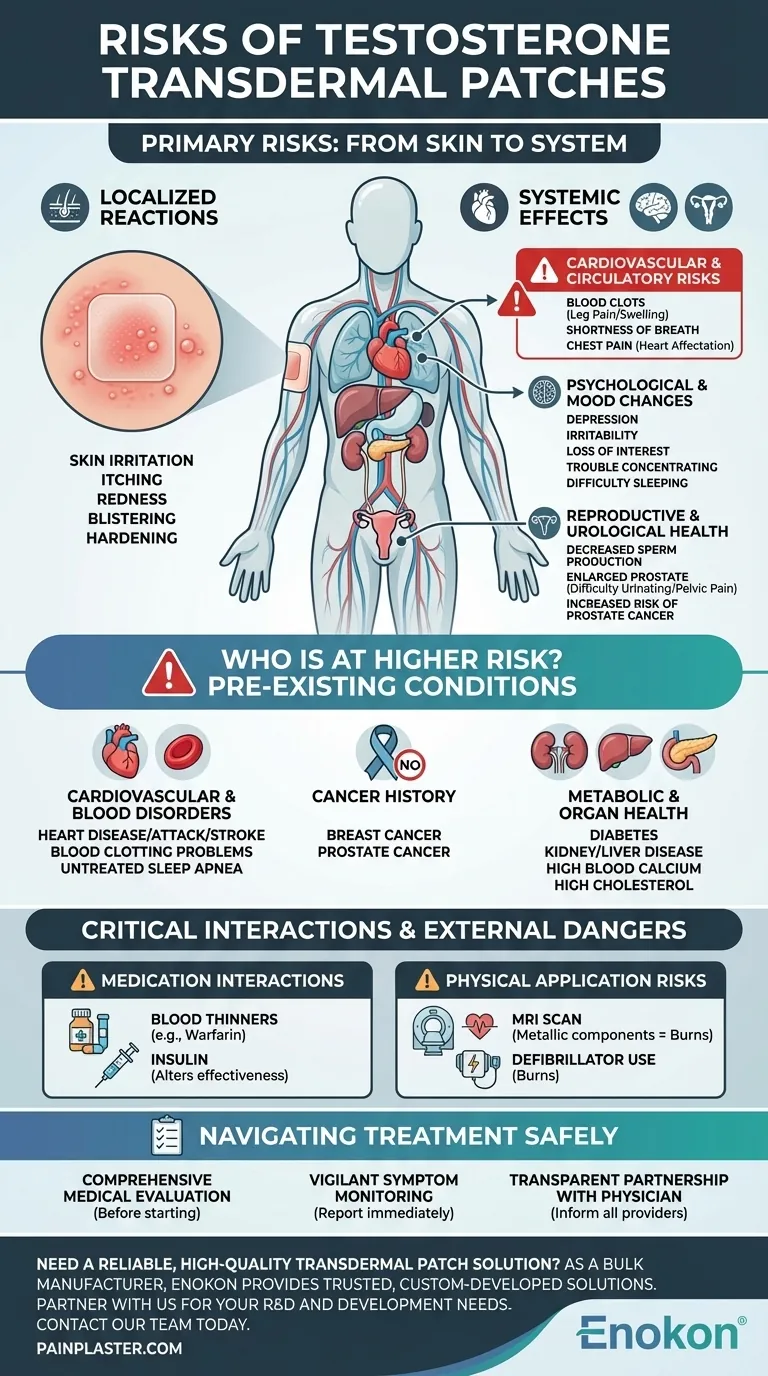The primary risks of using testosterone transdermal patches range from common skin irritation at the application site to more serious systemic effects impacting cardiovascular health, reproductive function, and mood. These risks are significantly influenced by pre-existing health conditions and interactions with other medications, making medical supervision essential.
Testosterone patch therapy is not a benign treatment. The decision to use it requires a careful evaluation of its significant potential side effects, especially concerning cardiovascular health and its interaction with other medical conditions and drugs.

Understanding the Primary Risks: From Skin to System
The effects of transdermal testosterone are not confined to the area of application. While local reactions are common, the hormone is absorbed into the bloodstream, creating the potential for widespread systemic side effects.
Common and Localized Reactions
The most frequently reported side effects occur directly where the patch is applied.
Your skin may react with itching, redness, blistering, or hardening. These reactions are typically mild but can be persistent and uncomfortable for some users.
Cardiovascular and Circulatory Risks
Some of the most serious risks involve the heart and blood vessels.
Users should be vigilant for signs of blood clots, such as pain or swelling in the legs. A clot that travels to the lungs can cause shortness of breath, while one affecting the heart can lead to chest pain. These symptoms require immediate medical attention.
Reproductive and Urological Health
Testosterone therapy directly impacts the male reproductive system and urinary tract.
It can lead to decreased sperm production, potentially affecting fertility. It may also worsen an enlarged prostate (benign prostatic hyperplasia), causing difficulty urinating or pelvic pain. Critically, it is associated with an increased risk of prostate cancer.
Psychological and Mood Changes
The hormonal changes can also have a significant impact on mental health.
Some users experience depression, irritability, or a general loss of interest or pleasure. Other potential effects include trouble concentrating and difficulty sleeping, which can impact overall quality of life.
Who Is at Higher Risk? Pre-existing Conditions
The safety of testosterone therapy is highly dependent on an individual's overall health. Certain conditions dramatically increase the potential for adverse effects.
Cardiovascular and Blood Disorders
Individuals with a history of heart disease, heart attack, or stroke face elevated risks. The same is true for those with blood clotting problems or untreated sleep apnea, as testosterone can exacerbate these conditions.
Cancer History
Testosterone patches are generally contraindicated for individuals with a history of breast cancer or prostate cancer, as the hormone can fuel the growth of these malignancies.
Metabolic and Organ Health
Underlying health issues in other systems also increase risk.
Conditions like diabetes, kidney or liver disease, high blood calcium (hypercalcemia), and high cholesterol all require careful consideration and monitoring, as testosterone can affect these systems unpredictably.
Critical Interactions and External Dangers
Beyond intrinsic side effects, risks also arise from how the patches interact with other medications and medical procedures.
Medication Interactions
Testosterone can have dangerous interactions with other drugs.
It is particularly risky when combined with blood thinners (anticoagulants) like warfarin or apixaban, and it can also alter the effectiveness of insulin. You must provide any prescribing doctor with a complete list of all medications you take.
Physical Application Risks
The physical nature of a patch presents unique dangers.
Some patches contain metallic components and can cause serious skin burns during an MRI scan. Similarly, a patch can lead to burns if a defibrillator is used on the chest area over the patch. Always inform medical personnel about your patch before any procedure.
Navigating Treatment Safely
Understanding these risks is the first step toward making an informed decision with your healthcare provider. The right course of action depends entirely on your specific health profile and treatment goals.
- If you are considering testosterone therapy: A comprehensive medical evaluation is non-negotiable to assess your baseline health, screen for underlying conditions, and determine if you are a suitable candidate.
- If you are currently using testosterone patches: Be vigilant for any new symptoms, report them to your doctor immediately, and ensure every one of your healthcare providers is aware you are on this therapy.
- If you have pre-existing health conditions: You must have a detailed discussion with a specialist to weigh whether the potential benefits of therapy genuinely outweigh your specific, heightened risks.
Ultimately, the safe use of testosterone patches hinges on a transparent and ongoing partnership with your physician.
Summary Table:
| Risk Category | Potential Side Effects |
|---|---|
| Localized Reactions | Skin redness, itching, blistering at application site |
| Cardiovascular | Blood clots, chest pain, shortness of breath |
| Reproductive/Urological | Decreased sperm count, enlarged prostate, prostate cancer risk |
| Psychological | Depression, irritability, mood swings, sleep issues |
| High-Risk Conditions | Heart disease, history of cancer, sleep apnea, blood clotting disorders |
Need a reliable, high-quality transdermal patch solution?
As a bulk manufacturer of safe and effective transdermal patches, Enokon provides healthcare and pharmaceutical distributors with trusted, custom-developed solutions. Our technical expertise ensures your products meet the highest standards for safety and efficacy.
Partner with us for your custom R&D and development needs. Contact our team today to discuss how we can support your brand with reliable transdermal technology.
Visual Guide

Related Products
- Prostate Pain Kidney Health Care Patch for Men
- Far Infrared Heat Pain Relief Patches Transdermal Patches
- Menthol Gel Pain Relief Patch
- Icy Hot Menthol Medicine Pain Relief Patch
- Capsaicin Chili Medicated Pain Relief Patches
People Also Ask
- What should be done if a testosterone patch is missed or falls off? Follow these simple timing rules for safety and consistency.
- How often should testosterone patches be applied? Daily Dosage & Best Practices
- What precautions should be taken when applying testosterone patches? Maximize Safety and Effectiveness
- What should be done before undergoing an MRI while using testosterone patches? Remove it to prevent serious burns.
- What should be done if a testosterone patch falls off? A Guide to Maintaining Hormone Stability













